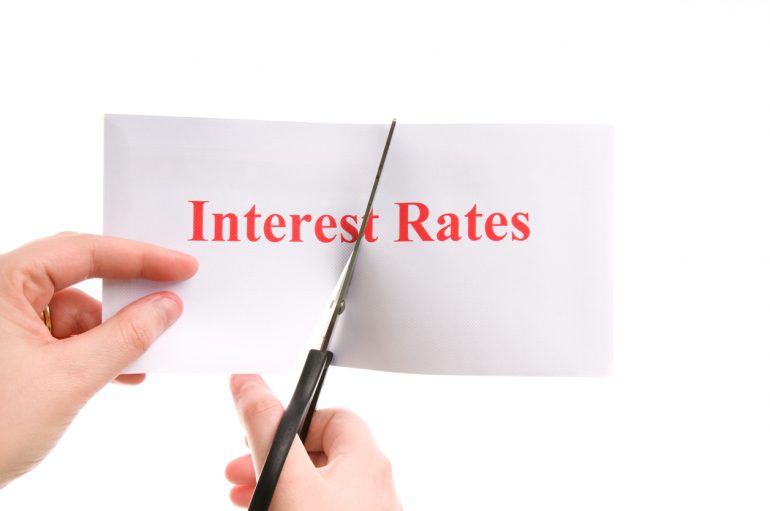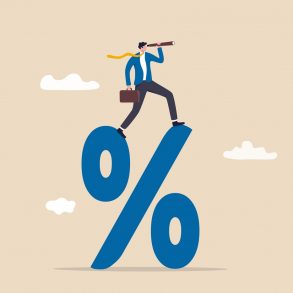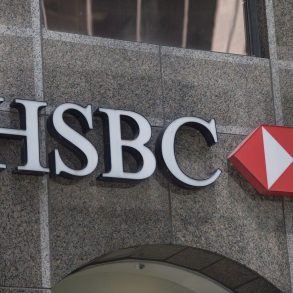For the second time in two weeks Canada’s prime rate has fallen by 50-percentage points.
Following the Bank of Canada’s emergency rate cut on Friday, RBC led the way in passing along the full 50 bps of rate cut on Monday, with most of the other big banks soon following suit.
That lowered the country’s prime rate—which is the basis of all floating mortgage rates and lines of credit—from 3.45% to 2.95%.
“Central banks are providing low cost funding (by cutting interest rates to nearly zero) and greasing the wheels of money…to ensure credit channels remain open,” wrote Josh Nye, senior economist with RBC Economics.
“This has come through loosely coordinated moves outside of central banks’ normal policy schedules, underlining the urgency of the situation,” he added. “For central banks like the Bank of Canada that still have a bit of conventional policy room, it’s only a matter of time before rates are cut to their positive lower bound of 0.25%.”
Big Banks Drop Prime Rate, But Adjust Their Discounts
 While Canada’s big banks dropped their prime rates by the full 50 basis points for the second time—to the surprise of some—the devil was in the details.
While Canada’s big banks dropped their prime rates by the full 50 basis points for the second time—to the surprise of some—the devil was in the details.
Several opted to instead increase their variable-rate premiums, effectively robbing new borrowers of the full rate savings.
For example, RBC raised its 5-year open variable from prime + 2.00% to prime + 2.50%, cancelling out the Bank of Canada’s rate cut.
Similarly, BMO left its advertised variable rates unchanged from where they were prior to the BoC rate cut by adding on a 50-bps premium.
“Ultimately, banks have no ability today to price a mortgage at less than 2.00% for new originations,” Ron Butler of Butler Mortgage Inc. told CMT. “The economic situation will continue to deteriorate and the BoC will likely continue to cut, and for new originations we will see continued moves that will leave variable rates at the same point prior to the cut.”
Which Begs the Question…Fixed or Variable?
All of this market mayhem and sharp rate moves have mortgage shoppers asking more than ever… “should I get a fixed or variable rate?”
The market has seen a flood of borrowers move into fixed rates due to falling bond yields since 2018, which a gradual decline in fixed mortgage rates over that period.
 “Even veteran borrowers who had saved handsomely with variable mortgage rates in the past have been piling into five-year fixed rates over the past two years,” noted mortgage expert Dave Larock of Integrated Mortgage Planners in a recent post. “But now, in what seems like the blink of an eye, the fixed- versus variable-rate trade off looks decidedly different.”
“Even veteran borrowers who had saved handsomely with variable mortgage rates in the past have been piling into five-year fixed rates over the past two years,” noted mortgage expert Dave Larock of Integrated Mortgage Planners in a recent post. “But now, in what seems like the blink of an eye, the fixed- versus variable-rate trade off looks decidedly different.”
That’s thanks to the Bank of Canada’s recent—and extreme—rate cuts amounting to a full percentage point in just a matter of weeks. That’s driven down variable rates, making them cheaper than fixed rates once again and a rather hot commodity.
Fixed rates have been slowly creeping back up as we reported on Monday. Fear of a prolonged economic downturn have lenders increasingly worried about market liquidity, as well as borrowers’ ability to repay their loans given the prospect of rising layoffs.
“If you’re a bank, you’re scared of losses right now,” Shawn Stillman, founder of mortgageoutlet.ca, told us previously. “The banks are in this to make money, and if they don’t think that they’re going to be able to make money because all of a sudden their default rate is going to go up, then they’re going to protect themselves by raising rates.”
And as we mentioned above, some variable rates are no longer falling by their full potential.
But there are still great deals to be had. Floating rates of prime – 1.00% are still available, either from mortgage brokers or non-broker channel lenders such as HSBC. But you’ll have to act fast, as there are significant rate movements by the day.
For those looking for more stability and are certain that they’ll remain in their home for the length of their mortgage term, there are insured 5-year fixed rates available for as low as 2.03%. Consider that just a year ago similar rates were going for a minimum of 2.89%.
With lenders growing more reluctant to pass through any additional rate cuts from the Bank of Canada, Butler says it’s “hard today to recommend a strategy that would favour variable over fixed if there is no distinct price advantage to variable, and today there isn’t.”
New Liquidity Measures Announced
 The Canada Mortgage and Housing Corporation also announced a revised Insured Mortgage Purchase Program (IMPP), which was first introduced during the financial crisis. The measure is aimed at supporting market liquidity.
The Canada Mortgage and Housing Corporation also announced a revised Insured Mortgage Purchase Program (IMPP), which was first introduced during the financial crisis. The measure is aimed at supporting market liquidity.
The program will see the government purchase up to $50 billion of insured mortgage pools via the CMHC.
“This action will provide stable funding to banks and mortgage lenders in order to ensure continued lending to Canadian consumers and businesses,” the announcement read.
On Tuesday, CMHC head Evan Siddall added, “The IMPP is part of a package that includes complementary market support activity from the Bank of Canada. We have scaled the solution to the problem and will have $50 billion available. We are also working with the government on expanding CMHC’s authorities if we need to do more.”








Where do you see rates going in the next year or so? I have 2 days to decide on a fixed at 2.29% or variable at prime -1.10%. I have always been variable but starting to think that once this virus is contained rates may go up quickly.
Who is giving a fixed 2.29% mortgage?
HSBC has a sign on Calgary for 1.95 on fixed
Niko, Simplii is offering us P-0.88 on a renewal, where did you get P-1.1%?
Is there any guideline or regulation for banks and lenders to adjust their prime rate by? My lender is not changing their prime rate till April1st. going by their website, my payment may not lower till the next payment cycle.
In this time of crisis lenders should react quickly!!
Taylor, I got it March 9 from First National. They offered me a renewal for 2.29% fixed for 5 years or prime -1.10%. It’s up now and the variable is now prime-.65 and the fixed is up to 2.69
I’m in the same boat with my bank and don;t know what to do. stay at variable minus 1% or go to fixed rates.
I’m in the exact same boat with FN!!
Given everything rapidly occuring, and all things being equal… bottom line… if you were renewing your mortgage right now, today, and still have these options available to you… what would you choose over a 5 year term?
A.) Fixed @ 2.29% OR
B.) Variable @ Prime – 1.1%
What would you do?! Any feedback and insight would be greatly appreciated! TIA.
RMG today STILL has their prime rate at 3.45%
I have a mortgage with T.D variable closed for 5 years rate is 1.95%. Should i stay the same or locked it for 5 years.Pls need replay?